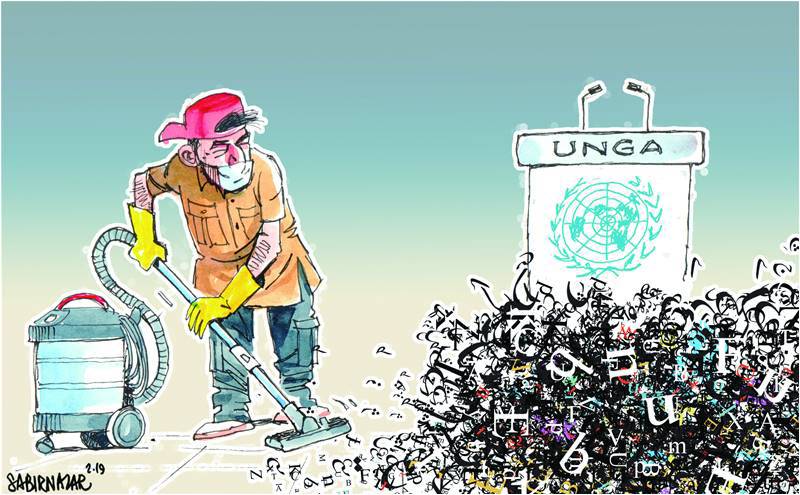

Water shortages
Madam,
Turbat faces a severe water crisis due to which residents of the city installed bore-tube wells to meet their needs for everyday life. Almost every house owns a tube-well with the ground water decreasing day by day. The water retrieved from inner layers consists of toxic radioactive metals, such as lead which is a cancer-causing agent. The installation is not only a threat to the environment, utilizing bore water is also becoming a health hazard. Therefore, I request the government and the concerned authorities to look into this matter and take measures concerning water shortage in the city.
Tilyan Aslam,
Turbat, Kech.

Suicides in armies
Madam,
In a report, India’s Defence Ministry indicated that despite psychological counselling and compulsory yoga exercises, suicides among soldiers remained continued. Even 40 percent of women, rarely deputed for combat duty, in paramilitary forces committed suicides. During the last six years, approximately 700 personnel of the Central Armed Police Forces have committed suicide and the rate of voluntary retirement is approximately 9,000 personnel per year.
The suicides are highest in Sashastra Seema Bal, followed by Central Industrial Security Force and Indo-Tibetan Border Police.
The ministry attributed suicides to “personal or family stress.” However, the ex-servicemen blamed “undemocratic” pay-and-allowance differentials between officers and lower ranks. Their main demands, as highlighted in a peaceful sit in, were: one rank, one pay – parity in pay and perks of commissioned officers and non-commissioned ranks. They claimed that the jawans were always in the line of fire and faced “maximum threat to their lives.” They also demanded that the ghetto system practiced by all armed forces and ancillary services be abolished. They also demanded elimination of sewadari (batmanship) system from the army. Soldiers are for fighting wars, not for serving as domestic servants. They also demanded re-structuring and modernising forces in a professional manner. They also called for an end to the abolition of VVIP racism in the armed forces, where even decent washrooms are not provided to jawans. They also asked for secure platforms for jawans to complain about officers’ corruption without fear of retribution (whistle-blower protection). These are serious demands and should be taken seriously. I believe leaders of our armed forces should also pay attention to voices from within their ranks to see what the soldiers are feeling.
Amna Riaz,
Rawalpindi.

Public library
Madam,
Bidduplh House is the only public library in Gilgit. The building, which was the residence of the first political agent of the then Gilgit Agency, John Biddulph, in 1867 was turned into a public library in 1948.
Unfortunately, the library is in a dilapidated condition today — the chairs and tables are broken, and the ancient fans, bulbs and electric boards tell an abominable tale of negligence by the authorities concerned.
The incumbent chief secretary has donated a precious and expensive book collection, but the staff lacks professionalism and is unable to keep them in good order. Books are often misplaced. There is no chief librarian or any librarian so it is quite chaotic from the reading room to the washroom.
The library timings are absolutely not suitable either.
Merely donating books is not enough. I request the chief secretary to visit the library someday and look at what has been made of those books, and kindly appoint a professional librarian to look after this historical asset.
Waqas Akbar,
Gilgit.
Importance of education
Madam,
Education plays a vital role in one’s life, shaping one’s future. Along with this, education grooms us and allows a country to prosper. Thus, it can be said that it is an essential part of one’s life. We cannot deny the importance of education. Napoleon once said: “Give me an educated mother, I shall promise you the birth of a civilised, educated nation.” I urge every citizen to receive proper educated that will open their minds and allow us to progress.
Malika Anwar,
Quetta.

Stray dogs
Madam,
There has been an alarming increase in the number of stray dogs in Karachi in the past few months. These animals are a source of nuisance and fear for people especially women and children.
The tragic death of a child in Larkana bitten by strays in his mother’s arms should serve as a wake-up call that stray dogs are a menace made all the more deadly because of a shortage of rabies vaccine in the country’s hospitals.
The concerned authorities should come up with a humane solution to deal with these mongrels and send them to animal shelters.
Azmat Jamal,
Karachi.

Old tracks
Madam,
When I was a child, I used to love riding the train with my father. He would travel to various towns and cities for work and I would accompany him. I enjoyed the motion of the bogies and the sights around me.
Later, after I got married and joined government service, I had to repeat the same travels with my own young family. Now, the motion of the train – the jumping and rattling of the bogies – produced an uncomfortable feeling. Walking to the toilet required great manoeuvring and I don’t even want to mention how difficult it was to use the toilet.
The minister for railways must introduce new trains in the network to facilitate more middle and lower class of passengers. But he should also keep in mind that some of the fatal derailments of the past were primarily due to old, technically obsolete, substandard tracks from the colonial era.
These should be thoroughly inspected and replaced with more metallurgical advanced tracks, particularly for the moderately high-speed trains.
Raza Bilal,
Lahore.

